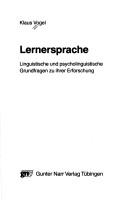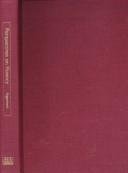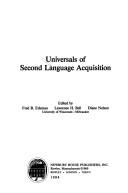| Listing 1 - 10 of 1295 | << page >> |
Sort by
|
Periodical
Abstract | Keywords | Export | Availability | Bookmark
 Loading...
Loading...Choose an application
- Reference Manager
- EndNote
- RefWorks (Direct export to RefWorks)

ISBN: 9783823341925 3823341928 Year: 1990 Publisher: Tübingen: Narr,
Abstract | Keywords | Export | Availability | Bookmark
 Loading...
Loading...Choose an application
- Reference Manager
- EndNote
- RefWorks (Direct export to RefWorks)

ISBN: 0472086049 Year: 2000 Publisher: Ann Arbor (Mich.) : University of Michigan press,
Abstract | Keywords | Export | Availability | Bookmark
 Loading...
Loading...Choose an application
- Reference Manager
- EndNote
- RefWorks (Direct export to RefWorks)
Book
Year: 2022 Publisher: Bochum : Ruhr-Universität Bochum,
Abstract | Keywords | Export | Availability | Bookmark
 Loading...
Loading...Choose an application
- Reference Manager
- EndNote
- RefWorks (Direct export to RefWorks)
Competence in the instructional language seems to be crucial to a successful educational biography. While most children do not lack oral competencies in German, many struggle with the (conceptually) written academic language register ('Bildungssprache') that is the most important medium of learning and performance assessment in school (Feilke, 2012; Gogolin et al., 2013; Morek & Heller, 2012; Heppt & Stanat, 2020; Volodina et al., 2020; Volodina & Weinert, 2020). The mastery of this register is im-portant for learning in all subjects. Even very early science teaching in primary school depends on language competencies. Thus, it is necessary to integrate language and science teaching (vgl. z. B. Rank & Wildemann, 2015). Its focus on interesting facts, observations and experiments qualifies science teaching to play an important role in language learning, because "learning about language is most meaningful when it occurs in the context of actual language use" (Gibbons, 2002, S. 12). Ideas and concepts for the integration of language and science teaching exist (e. g. Gibbons, 2002). However, studies investigating their efficacy are missing. This work tries to contribute in closing this research gap. First, it presents a teaching unit for science teaching in fourth grade that integrates language teaching. Its scientific topic is the process of dissolving substances in water. Based on science teaching methods, the teaching unit integrates language and science teaching by merging Gibbons' scaffolding concept (Gibbons, 2002), focus-on-form techniques from second language learning approaches (e. g. Ellis, 2016) and conceptual change ideas (e.g. Möller, 2015). Second, I conducted a quasi-experimental intervention study with pretest-posttest design, control group and randomised assignment at class level in order to investigate the efficacy of this teaching unit. N = 107 fourth grade students participated in this study, coming from six classrooms within three schools located in Baden-Württemberg, Germany. In this intervention study I taught the unit myself in order to control its implementation and to enhance the comparability of the instruction in the three intervention classrooms. The results of this study show that the intervention had effects on the students regarding their educational language. In the teaching unit, they learnt among other things that conditionals are an appropriate structure to formulate if-clauses in a generalising matter within scientific descriptions of experiments. They also learnt to build and use the German Verb-first-conditional, a conceptually written, academic linguistic structure that is considered to cause difficulties in reading comprehension. They further learnt to (re-)phrase descriptions of experiments in an impersonal, academic way, using the German indefinite pronoun man or passive voice. A test on the scientific topic that was only conducted in the posttest indicates learning achievements in scientific knowledge concerning the process of dissolving substances in water. Thus, the study shows that it is possible to efficaciously integrate language and science teaching in primary schools based on the ideas of scaffolding and focus-on-form techniques.
Book
Year: 2022 Publisher: Bochum : Ruhr-Universität Bochum,
Abstract | Keywords | Export | Availability | Bookmark
 Loading...
Loading...Choose an application
- Reference Manager
- EndNote
- RefWorks (Direct export to RefWorks)
Competence in the instructional language seems to be crucial to a successful educational biography. While most children do not lack oral competencies in German, many struggle with the (conceptually) written academic language register ('Bildungssprache') that is the most important medium of learning and performance assessment in school (Feilke, 2012; Gogolin et al., 2013; Morek & Heller, 2012; Heppt & Stanat, 2020; Volodina et al., 2020; Volodina & Weinert, 2020). The mastery of this register is im-portant for learning in all subjects. Even very early science teaching in primary school depends on language competencies. Thus, it is necessary to integrate language and science teaching (vgl. z. B. Rank & Wildemann, 2015). Its focus on interesting facts, observations and experiments qualifies science teaching to play an important role in language learning, because "learning about language is most meaningful when it occurs in the context of actual language use" (Gibbons, 2002, S. 12). Ideas and concepts for the integration of language and science teaching exist (e. g. Gibbons, 2002). However, studies investigating their efficacy are missing. This work tries to contribute in closing this research gap. First, it presents a teaching unit for science teaching in fourth grade that integrates language teaching. Its scientific topic is the process of dissolving substances in water. Based on science teaching methods, the teaching unit integrates language and science teaching by merging Gibbons' scaffolding concept (Gibbons, 2002), focus-on-form techniques from second language learning approaches (e. g. Ellis, 2016) and conceptual change ideas (e.g. Möller, 2015). Second, I conducted a quasi-experimental intervention study with pretest-posttest design, control group and randomised assignment at class level in order to investigate the efficacy of this teaching unit. N = 107 fourth grade students participated in this study, coming from six classrooms within three schools located in Baden-Württemberg, Germany. In this intervention study I taught the unit myself in order to control its implementation and to enhance the comparability of the instruction in the three intervention classrooms. The results of this study show that the intervention had effects on the students regarding their educational language. In the teaching unit, they learnt among other things that conditionals are an appropriate structure to formulate if-clauses in a generalising matter within scientific descriptions of experiments. They also learnt to build and use the German Verb-first-conditional, a conceptually written, academic linguistic structure that is considered to cause difficulties in reading comprehension. They further learnt to (re-)phrase descriptions of experiments in an impersonal, academic way, using the German indefinite pronoun man or passive voice. A test on the scientific topic that was only conducted in the posttest indicates learning achievements in scientific knowledge concerning the process of dissolving substances in water. Thus, the study shows that it is possible to efficaciously integrate language and science teaching in primary schools based on the ideas of scaffolding and focus-on-form techniques.
Book
Year: 2022 Publisher: Bochum : Ruhr-Universität Bochum,
Abstract | Keywords | Export | Availability | Bookmark
 Loading...
Loading...Choose an application
- Reference Manager
- EndNote
- RefWorks (Direct export to RefWorks)
Competence in the instructional language seems to be crucial to a successful educational biography. While most children do not lack oral competencies in German, many struggle with the (conceptually) written academic language register ('Bildungssprache') that is the most important medium of learning and performance assessment in school (Feilke, 2012; Gogolin et al., 2013; Morek & Heller, 2012; Heppt & Stanat, 2020; Volodina et al., 2020; Volodina & Weinert, 2020). The mastery of this register is im-portant for learning in all subjects. Even very early science teaching in primary school depends on language competencies. Thus, it is necessary to integrate language and science teaching (vgl. z. B. Rank & Wildemann, 2015). Its focus on interesting facts, observations and experiments qualifies science teaching to play an important role in language learning, because "learning about language is most meaningful when it occurs in the context of actual language use" (Gibbons, 2002, S. 12). Ideas and concepts for the integration of language and science teaching exist (e. g. Gibbons, 2002). However, studies investigating their efficacy are missing. This work tries to contribute in closing this research gap. First, it presents a teaching unit for science teaching in fourth grade that integrates language teaching. Its scientific topic is the process of dissolving substances in water. Based on science teaching methods, the teaching unit integrates language and science teaching by merging Gibbons' scaffolding concept (Gibbons, 2002), focus-on-form techniques from second language learning approaches (e. g. Ellis, 2016) and conceptual change ideas (e.g. Möller, 2015). Second, I conducted a quasi-experimental intervention study with pretest-posttest design, control group and randomised assignment at class level in order to investigate the efficacy of this teaching unit. N = 107 fourth grade students participated in this study, coming from six classrooms within three schools located in Baden-Württemberg, Germany. In this intervention study I taught the unit myself in order to control its implementation and to enhance the comparability of the instruction in the three intervention classrooms. The results of this study show that the intervention had effects on the students regarding their educational language. In the teaching unit, they learnt among other things that conditionals are an appropriate structure to formulate if-clauses in a generalising matter within scientific descriptions of experiments. They also learnt to build and use the German Verb-first-conditional, a conceptually written, academic linguistic structure that is considered to cause difficulties in reading comprehension. They further learnt to (re-)phrase descriptions of experiments in an impersonal, academic way, using the German indefinite pronoun man or passive voice. A test on the scientific topic that was only conducted in the posttest indicates learning achievements in scientific knowledge concerning the process of dissolving substances in water. Thus, the study shows that it is possible to efficaciously integrate language and science teaching in primary schools based on the ideas of scaffolding and focus-on-form techniques.
Book
Year: 2017 Publisher: Amsterdam ; Philadelphia : John Benjamins Publishing Company,
Abstract | Keywords | Export | Availability | Bookmark
 Loading...
Loading...Choose an application
- Reference Manager
- EndNote
- RefWorks (Direct export to RefWorks)

ISBN: 0883773406 9780883773406 Year: 1984 Publisher: London Newbury House
Abstract | Keywords | Export | Availability | Bookmark
 Loading...
Loading...Choose an application
- Reference Manager
- EndNote
- RefWorks (Direct export to RefWorks)
Language acquisition --- Linguistic universals --- Interlanguage (Language learning)
Periodical
Abstract | Keywords | Export | Availability | Bookmark
 Loading...
Loading...Choose an application
- Reference Manager
- EndNote
- RefWorks (Direct export to RefWorks)
literature --- linguistics --- language teaching --- language learning
Book
ISBN: 1009082701 1009077546 1009085166 1009085360 Year: 2022 Publisher: Cambridge : Cambridge University Press,
Abstract | Keywords | Export | Availability | Bookmark
 Loading...
Loading...Choose an application
- Reference Manager
- EndNote
- RefWorks (Direct export to RefWorks)
This Element introduces the areas that second language (L2) pragmatics research has investigated. It begins with a theme-based review of the field with respect to L2 pragmatics learning, teaching, and assessing. The section on pragmatics learning examines studies on learners' pragmatic production and perception, and analyzes research modalities in this field. The section on pragmatics teaching examines the effects of and different approaches to L2 pragmatics instruction; and the section on pragmatics assessing examines the aspects involved in testing learners' pragmatic competence, and studies on issues related to validity and rating in pragmatics assessing. The Element then analyzes studies exploring learners' cognitive processes during pragmatic performance, and case studies are provided to showcase two ongoing projects, one investigating advanced learners' self-praise on social media and the other investigating lingua franca pragmatics among children. Finally, the Element offers some topics and questions for future research in L2 pragmatics.
Pragmatics. --- Second language acquisition. --- Interlanguage (Language learning)
| Listing 1 - 10 of 1295 | << page >> |
Sort by
|

 Search
Search Feedback
Feedback About UniCat
About UniCat  Help
Help News
News